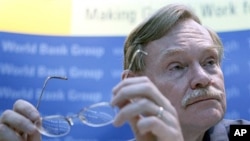The process of selecting the next head of the World Bank is taking some unusual twists and turns, but may end up following the tradition of putting an American in charge.
The bank's mission is to fight global poverty, and many developing nations and experts argue that it is long past time for the first non-American to take the top job.
Nominations to replace Robert Zoellick, the latest in a long line of Americans to head the World Bank, are not being made public until top bank officials cut the list down to only three names.
That will probably happen sometime after March 23, when the nomination process closes.
Under an informal agreement that some critics call outdated and unfair, an American has always run the the bank.
And the Obama administrations says it will nominate a strong candidate for the post.
A top World Bank official from Indonesia, Hekinus Manao, said the institution is using merit-based criteria to fill the job. The World Bank's mission is to cut poverty. Manao said that means the bank's many member nations should nominate candidates with international experience and a commitment to development.
"I agree to some extent that we could be skeptical, but we could also be optimistic on that," Manao said.
But U.S. Congresswoman Betty McCollum - co-chair of the World Bank Caucus - said outgoing bank president Robert Zoellick improved the way the institution deals with soaring food prices, disease, conflict, and poverty, making it more likely another American will get the job.
She said the United States provides the largest share of funds for the bank, and having an American in charge will make it easier to persuade skeptical members of Congress to approve funding for the bank in a time of tight budgets.
"Could someone else do that? Possibly. Would it be a lot harder for them? Absolutely," she said.
The search for a new World Bank chief took an unusual turn when a prominent development expert, Jeffrey Sachs, head of the Earth Institute at Columbia University in New York, put his own name forward as a candidate. While he is an American, he has won the endorsement of several countries, including Kenya and Malaysia. So far, the Obama administration has not endorsed him or anyone else.
The financial media have mentioned many possible candidates, including U.S. Ambassador to the United Nations Susan Rice, who has experience working with African nations.
Other possibilities: Indra Nooyi, the Indian-born head of the Pepsi company who is a U.S. citizen, and Nandan Nilekani, who started the large Indian technology firm Infosys.







